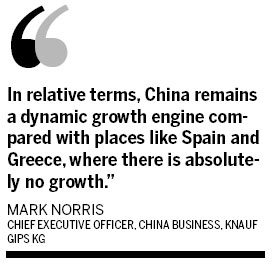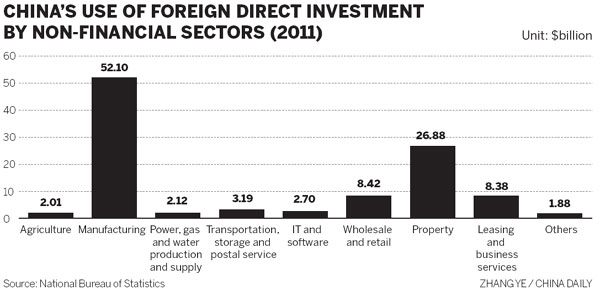Foreign firms bullish about economy
Updated: 2012-05-07 07:49
By He Wei in Shanghai (China Daily)
|
|||||||||||
Challenges ahead
 |
While foreign players have long wrestled with human resource constraints and intellectual property rights protection issues, they now rate rising costs and geographic diversity as emerging concerns.
More than nine in 10 companies surveyed by AmCham said rising costs hinder their business, with two-thirds saying price pressures are becoming more severe.
"Nobody is immune to the rising costs of labor, raw material and energy," Norris said. But as every enterprise has to tackle these issues, Norris sees opportunities.
Knauf will introduce one of its hit products, spray plaster, to China in 2012. The building method is up to three times faster than manual plastering, enabling a three-man team to complete up to 150 square meters of high-quality plasterwork every day. And by applying such practices, Knauf helps his clients save labor costs.
It is the same story with Trumpf. Although its products are generally two to three times more expensive than those from its domestic counterparts, Leibinger-Kammueller said their machines offer great advantages.
"Ten years ago, labor was very cheap in China, but not any more. As our Chinese customers also face soaring labor costs, they gradually turn to our machinery to save labor," she said.
Companies cite China's vast geographic diversity as another challenge.
And this has led multinationals to cautiously expand to inland cities, not for the sake of expansion, but out of various considerations.
"In terms of geographic coverage, the Chinese market is huge. Our customers always require a rapid and effective response to fulfill their critical demands. It's quite challenging for us to move our products in an efficient way from our manufacturing sites in the coastal areas to customers across China," Sykes from Dow said.
In order to cope with this, Dow pays close attention to the supply chain, distribution, and logistics capabilities. It has invested $200 million in a terminal and logistics center and a transactional processing service center in Tianjin.
Knauf is also considering heading west but the plan is still under evaluation. Such a move could help the company cut its freight costs by up to 25 percent..
While reducing costs is one concern, Kirwan from Gap has his own reasoning.
"In the US, when we are doing particularly well in one area and not so well in another, we are able make adjustments accordingly. But here we found it a little bit more difficult in China, where each key area and city has its unique circumstances," he said.
The company is steadily expanding so that it can learn more about how to cope with situations, he added.
According to Steinbock, companies must adapt to local needs to remain relevant in China. Most importantly, they must learn to think in terms of China's diversity, which will be an increasing reality.
There is also increased competition. The AmCham study showed most respondents identify Chinese private companies, followed by other foreign firms, as the source of the largest surge in competition.
Regarding regulation, companies will be held to an increasingly mature set of standards in realms such as food safety, workforce protection and manufacturing safety, said Butler.
"We believe the disciplining effect brought on by the maturation of the market is overall positive for Western players but may pose short-term challenges."
Evolving agenda
And companies noticed an interesting phenomenon - the evolving attitude toward foreign companies from local governments.
In the past, governments welcomed any foreign investors who could push up local GDP and raise the employment rate. Now they tend to be more "selective and picky" in terms of who to get to invest.
Wale from General Motors said a particular city will welcome your investment if what you are doing happens to coincide with its strategic layout.
In the case of General Motors, some local governments would like to utilize its presence to either reform the overall industrial sector or to catch up in areas such as safety regulations and emissions.
The one thing Norris found is that government officials speak about "sustainability" all the time, which was a rare occurrence even three years ago.
"When we were looking west, we found some great zones. But the officials in these places would turn down our requests because they found us hard to fit into those parks that are designed as either a pharmaceutical zone or an automobile zone," he said.
And the governments are now looking for role models to stay energy-efficient. "We were driven and challenged by the Taicang government to hit this level of green and sustainability. This is rare," he said.
Steinbock believed that local governments should focus on attracting only appropriate foreign investment that supports their overall growth policies. In turn, foreign multinationals should focus on appropriate localities that best serve their strategies.
"Let's compare this with the US market. With more than 310 million people, the US has some 50 states, which have grown increasingly specialized focusing on different comparative advantages.

"China is in a different stage of development, but the same process of differentiation has begun on the mainland as well. Being selective and picky is a good thing."
Contact the writer at hewei@chinadaily.com.cn
Today's Top News
President Xi confident in recovery from quake
H7N9 update: 104 cases, 21 deaths
Telecom workers restore links
Coal mine blast kills 18 in Jilin
Intl scholarship puts China on the map
More bird flu patients discharged
Gold loses sheen, but still a safe bet
US 'turns blind eye to human rights'
Hot Topics
Lunar probe , China growth forecasts, Emission rules get tougher, China seen through 'colored lens', International board,
Editor's Picks

|

|

|

|

|

|





